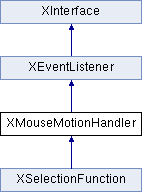makes it possible to receive mouse motion events on a window. More...
Inheritance diagram for XMouseMotionHandler:

Public Member Functions | |
| boolean | mouseDragged ([in] com::sun::star::awt::MouseEvent e) |
| is invoked when a mouse button is pressed on a window and then dragged. | |
| boolean | mouseMoved ([in] com::sun::star::awt::MouseEvent e) |
| is invoked when the mouse button has been moved on a window (with no buttons down). | |
 Public Member Functions inherited from XEventListener Public Member Functions inherited from XEventListener | |
| void | disposing ([in] com::sun::star::lang::EventObject Source) |
| gets called when the broadcaster is about to be disposed. | |
 Public Member Functions inherited from XInterface Public Member Functions inherited from XInterface | |
| any | queryInterface ([in] type aType) |
| queries for a new interface to an existing UNO object. | |
| void | acquire () |
| increases the reference counter by one. | |
| void | release () |
| decreases the reference counter by one. | |
Detailed Description
makes it possible to receive mouse motion events on a window.
- See also
- com::sun::star::awt::XMouseMotionListener This handler is more flexible, because it optionally allows the consumption of key events.
Member Function Documentation
◆ mouseDragged()
| boolean mouseDragged | ( | [in] com::sun::star::awt::MouseEvent | e | ) |
is invoked when a mouse button is pressed on a window and then dragged.
Mouse drag events will continue to be delivered to the window where the first event originated until the mouse button is released (regardless of whether the mouse position is within the bounds of the window).
- Returns
- When
FALSEis returned the other handlers are called and a following handling of the event by the broadcaster takes place. Otherwise, whenTRUEis returned, no other handler will be called and the broadcaster will take no further actions regarding the event.
◆ mouseMoved()
| boolean mouseMoved | ( | [in] com::sun::star::awt::MouseEvent | e | ) |
is invoked when the mouse button has been moved on a window (with no buttons down).
- Returns
- When
FALSEis returned the other handlers are called and a following handling of the event by the broadcaster takes place. Otherwise, whenTRUEis returned, no other handler will be called and the broadcaster will take no further actions regarding the event.
The documentation for this interface was generated from the following file:
- com/sun/star/awt/XMouseMotionHandler.idl